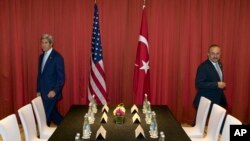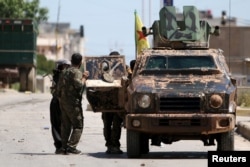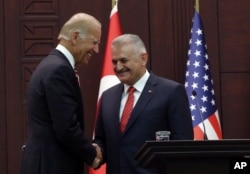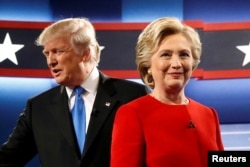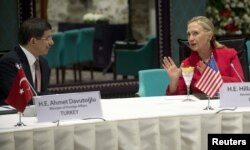Turkish media reported diplomatic tensions dogged the now-concluded two-day visit to Ankara of U.S. Deputy Secretary of State Antony Blinken and Brett McGurk, Special Presidential Envoy for the Global Coalition to Counter Islamic State.
McGurk was reprimanded for accepting a medal from the Syrian Kurdish militia the YPG, a key U.S. ally in the war against Islamic State. “Don’t do it again,” President Recep Tayyip Erdogan was reported to have said at the end of their meeting.
Ankara accuses the YPG of being terrorists linked to the banned PKK, which Turkey has been battling for more than 30 years.
The dispute is one of many that has soured relations between the two NATO allies.
In the past few weeks, Washington has been working to repair relations. U.S. Vice President Joe Biden visited Ankara and Erdogan met with his U.S. counterpart, Barack Obama, on the sidelines of a meeting in China of the 20 biggest economies earlier this month.
Those efforts appeared to unravel during Erdogan’s visit last week to New York. “Turkish-U.S. relations are incapable of getting over their tension,” said international relations expert Soli Ozel of Istanbul’s Kadir Has University.
“Between two weeks ago in China, a sense of OK, we’ve settled our differences, we’ve agreed to disagree to disagree, but we will get along [now] — to a position whereby everything that Erdogan says particularly on his way back home, is almost in defiance of the United States on different issues.”
US presidential elections
Ankara’s demand for the extradition of Turkish cleric Fethullah Gulen, who it blames for July’s failed coup in Turkey, also soured Erdogan’s visit to the United States.
The U.S. presidential elections are increasingly seen as a complicating factor in bilateral relations.
“There seems to be a difficulty on the U.S. side to commit itself to a long-term strategy, whether it's to do with Gulen or Syria - also for strategic changes, which Turkey is asking for,” said Sinan Ulgen, visiting scholar at Carnegie Europe in Brussels.
“Therefore it has become a difficult environment for the relationship. This is very much a consequence of the electoral atmosphere in which President Obama appears to be wanting to leave these decisions to who replaces him.”
Former senior Turkish diplomat Aydin Selcen says Ankara is increasingly looking beyond President Obama and the possible election of Hillary Clinton.
“Hillary Clinton knows Turkey very well because she was the secretary of state and Turkey knows her very well. And she is someone who is more inclined to have a stronger hand in Syria and who will be readier to work with Ankara on those PKK files and Syria file. So this leads me to believe...the presidential elections will be important to Ankara,” said Selcen.
Turkey’s ruling AK Party has, according to a government source, reached out to the other U.S. presidential hopeful, Donald Trump. “Ankara is pretty excited or optimistic about a possible Trump presidency,” says international relations expert Ozel, “partially because Trump congratulated Mr. Erdogan for his stance during the attempted coup back on 15 July. And usually the Turks like the Republicans better than the Democrats, as they don't care that much about human rights abuses and don't really hold Turkey to high standards on democracy and that.”
Bilateral relations, however, could continue to worsen in the short term, with conflicting messages coming from Washington.
“The electoral mood in the U.S. is making inter-agency cooperation and inter-agency cohesion more difficult,” observes analyst Ulgen, “because the type of conciliatory messages Ankara receives were essentially messages by the White House and by the State Department. Whereas, the Pentagon seems to be on a different wavelength of trying to continue to support the YPG in this region.”
Ankara is angered by the fact the Pentagon is considering directly arming the YPG. Erdogan reportedly challenged Biden during his meeting in New York that the U.S. military had already carried out arms drops to the Syrian militia this month.




